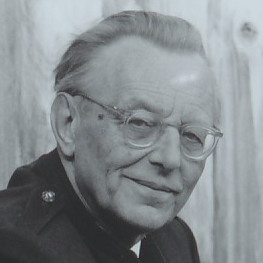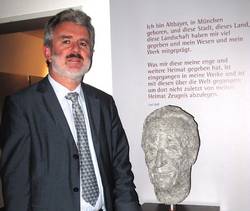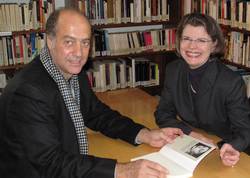A Spaniard and an Upper Bavarian join the board of trustees – global dissemination and local roots
DIESSEN/Munich – The Carl Orff Foundation aims to intensify the international presence of the universal works and achievements of the musical educationalist, composer, man of the theatre and humanist Carl Orff (1895 – 1982) on the firm foundation of its roots in the market town of Diessen. At the end of November 2009, the institution progressed a step closer to its aspirations with the appointment of two new members to the board of trustees: the Mayor of Diessen, Herbert Kirsch, and Dr. Polo Vallejo from Madrid in Spain. “These two personalities respectively underline both the regional localisation and the global impact of the foundation,” the solicitor Ute Hermann rejoices: she has been the executive member of the management board at the Carl Orff Foundation for the past two years.
The management board and the board of trustees meet up for discussion twice a year. At the end of a long day of meetings in Munich, all parties declared themselves satisfied with the appointment of the new board members. At the press conference, the Mayor of Diessen, Herbert Kirsch, underlined how much he was looking forward to his new duties as a member of the board of trustees. His prime commitment would be to the Carl Orff Museum, the only one of its kind worldwide, which is situated in the Rink House on the market square Hofmarkt in Diessen. He continued: “I consider it a great honour for our market town that I have been selected to join the board of trustees in my capacity as the local mayor.”
Polo Vallejo is also proud of his appointment to the board; the Spaniard is a doctor of music ethnology and his previous research has primarily focused on Africa and Georgia. Here he is following in the footsteps of Carl Orff who undertook extensive studies of the musical culture of non-European peoples. Vallejo is also a composer and teaches the Orff Schulwerk in Madrid. He has additionally travelled extensively round the world on behalf of the Carl Orff Foundation to give courses for the promotion of Orff’s elemental music and movement educational programme. He therefore incorporates three components of the foundation’s activities in a single person: research, the fostering of educational concepts and artistic activity.
Liselotte Orff, the composer’s widow and the foundation’s director for 24 years who only transferred the directorship of the organisation to the composer and Orff pupil Wilfried Hiller in 2008, also returned to Lake Ammer in good spirits following the conference in Munich. Her aim to integrate younger figures into the committee has been fulfilled with the appointment of the two new members of the board of trustees who are both 50 years old. This has also augmented the size of the committee from its previous six members to the current total of eight decision-makers.
Orff’s intellectual and artistic legacy
The composer made provisions for the Carl Orff Foundation in his will. This foundation is a non-profit making public incorporated organisation and is situated in Diessen on the banks of Lake Ammer where Carl Orff lived from 1955 until his death. The office headquarters are currently in Raisting, but, according to Ute Hermann, “the foundation would like to return to Diessen.” This is the location of Orff’s residential house and his work house containing his study; both these buildings have been retained in their original condition.
“The foundation preserves the artistic and educational estate of Carl Orff and protects and disseminates his intellectual and artistic legacy”; this is how the purpose of the foundation is described in its statutes. These aims are achieved through by securing original artefacts from the inventory of the artistic estate to ensure that these will never be sold, the promotion of academic research into Carl Orff’s works and encouragement for the public understanding for the universal oeuvre of Carl Orff and support for its dissemination.
The board of trustees is assigned the task of accompanying and supporting the activities of the management board. According to Ute Hermann, the board’s support can be defined as being its most vital task which focuses on the annual budget plan to determine the distribution of the foundation funds. The members of the board of trustees additionally become involved in topical discussion, for example on the subject of support for Orff’s educational works. This includes the dissemination of the Orff Schulwerk as a medium of intercultural and musical educational exchange throughout the world.
A further task is the international positioning of Orff’s artistic output. Alongside “Carmina Burana” which as the most frequently performed choral and orchestral work in the world enjoys a high degree of recognition, the main focus here is on Carl Orff’s lesser known but no less impressive compositions for the stage. The Carl Orff Foundation is additionally involved in the running of the Museum in Diessen (the foundation and the market town of Diessen currently cooperate in its legal supervision) and the Festival “Orff in Andechs”. The foundation additionally provides support for research and documentation projects undertaken by the Orff Centre in Munich, for example the financing of publications, the conservation of the current inventory, purchases for the inventory and the awarding of doctoral scholarships. Ute Hermann comments: “We have a relatively broad spectrum of tasks to be fulfilled.”
Beate Bentele



